How to Prevent and Treat Acne
Whether you're dealing with occasional pimples or persistent breakouts, understanding how to prevent and treat acne can make a significant difference in your skin’s appearance and overall health. In this article, we’ll discuss practical methods to prevent and treat acne, including natural remedies, dietary changes, and lifestyle tips that promote clear skin.
How to Prevent and Treat Acne Naturally?
When it comes to managing acne, many people prefer how to prevent and treat acne naturally. Natural treatments can be effective and gentle on the skin. Below are some proven methods to help control and prevent acne:
-
Tea Tree Oil: This essential oil has natural antibacterial properties that can reduce inflammation and clear up acne. Applying diluted tea tree oil to your breakouts with a cotton swab can help kill acne-causing bacteria and promote healing.
-
Aloe Vera: Known for its soothing and anti-inflammatory properties, aloe vera is perfect for treating acne. Aloe vera gel can be applied directly to the affected area to reduce swelling and redness.
-
Honey and Cinnamon Mask: Both honey and cinnamon have antimicrobial properties that can help combat acne. Create a paste by mixing the two and apply it to the affected areas for about 10-15 minutes before rinsing off with warm water.
Acne Prevention Diet
An acne prevention diet can play a crucial role in managing breakouts. While there's no one-size-fits-all approach, making certain dietary changes may help improve your skin’s health. Consider the following:
-
Reduce High-Glycemic Foods: Foods like white bread, pasta, and sugary snacks can cause spikes in blood sugar levels, leading to increased oil production and acne.
-
Include Omega-3 Fatty Acids: Fatty acids found in fish like salmon, flaxseeds, and walnuts help reduce inflammation, which is key in preventing acne. A diet rich in omega-3s may help keep acne flare-ups at bay.
-
Eat Antioxidant-Rich Foods: Fruits and vegetables, especially those high in antioxidants like berries, spinach, and kale, can help fight free radicals that contribute to skin damage and acne.
-
Hydrate Well: Drinking plenty of water throughout the day is essential for flushing out toxins and keeping your skin hydrated.
How to Prevent and Treat Acne Scars?
Even after acne heals, scars can remain as an unwanted reminder of past breakouts. Here's how to prevent and treat acne scars effectively:
-
Sun Protection: Exposure to sunlight can darken acne scars, making them more noticeable.
-
Retinoids: Topical retinoids can help speed up cell turnover, reducing the appearance of acne scars. They stimulate collagen production, which aids in skin regeneration.
-
Exfoliation: Gently exfoliating your skin with a mild scrub or exfoliant containing alpha hydroxy acids (AHAs) can help fade scars by removing dead skin cells and promoting new cell growth.
-
Microneedling: For deeper scars, microneedling, performed by a professional, can help stimulate collagen production and improve skin texture.
How to Prevent and Treat Acne at Home?
For many, visiting a dermatologist isn’t always an option, so understanding how to prevent and treat acne at home is essential.
-
Cleansing: Cleanse your face twice a day using a gentle, non-comedogenic cleanser to remove excess oil, dirt, and bacteria. Over-washing can irritate the skin, so stick to two cleanses daily.
-
Topical Treatments: Over-the-counter products containing benzoyl peroxide or salicylic acid can be effective in treating acne. These ingredients help reduce acne-causing bacteria and exfoliate the skin.
-
Spot Treatments: Use targeted treatments for active pimples, such as gels or creams that contain benzoyl peroxide, salicylic acid, or sulfur. These treatments help dry out the pimples without affecting the surrounding skin.
-
Avoid Picking at Pimples: Picking or popping pimples can lead to scarring and make the condition worse. Always resist the urge to touch your face unnecessarily.
How to Cure Acne Naturally in 3 Days?
While curing acne in 3 days is not always realistic, you can reduce the appearance of pimples with fast-acting natural remedies.
-
Ice Cubes: Applying ice to inflamed pimples can help reduce swelling and redness in just a few hours. Wrap an ice cube in a cloth and hold it against the acne for a few minutes.
-
Apple Cider Vinegar: Diluted apple cider vinegar can help balance the skin’s pH levels and prevent acne. Apply a diluted mixture to the skin and leave it on for 5-10 minutes before rinsing off.
-
Lemon Juice: Lemon juice contains citric acid, which can help reduce acne and lighten scars. Apply fresh lemon juice to affected areas and leave it on for 10-15 minutes before washing off.
How to Prevent and Treat Acne-Prone Skin?
For those with acne-prone skin, it’s important to follow a regular skincare routine that helps keep your pores clear and prevent new breakouts. Here’s what you can do:
-
Choose Oil-Free Products: Look for makeup, sunscreen, and moisturizers labeled as “non-comedogenic,” meaning they won’t clog pores.
-
Consistent Skincare Routine: Stick to a daily routine of cleansing, exfoliating, and moisturizing to help prevent the buildup of dead skin cells and oil that can lead to acne.
-
Avoid Harsh Scrubs: Aggressive exfoliation can irritate acne-prone skin, so use gentle exfoliants and avoid scrubbing your skin too hard.
How to Prevent Pimples for Teenagers?
Teenagers are particularly prone to acne due to hormonal changes, which can increase oil production in the skin. Here’s how to prevent pimples for teenagers:
-
Establish a Skincare Routine Early: Teenagers should start a skincare routine early to prevent acne. Cleanse regularly, use non-comedogenic products, and avoid touching the face.
-
Dietary Changes: Encourage a healthy diet rich in fruits, vegetables, and whole grains, and low in sugary snacks and processed foods.
-
Reduce Stress: Teenagers often face high-stress levels, which can trigger acne.





Comments
Post a Comment